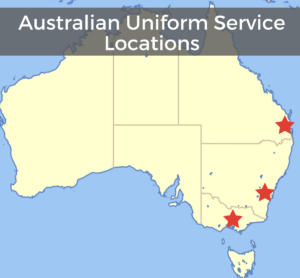AUSTRALIAN UNIFORM SERVICE

If you are thinking about selling your business, learn from Simon JT Davis, Group General Manager and Partner of Australian Uniform Service. Mr. Davis, started his independent textile rental services company ten years ago. From the outset, he worked to build a profitable and sustainable business with a culture that would transcend individual leadership. His end game was a transaction worthy of his efforts, and he just finished the final move on the chessboard: His company has recently become a division of Alsco, the leader in the market with over 75 years of experience.
Davis deployed several key principles to ensure a successful outcome for Australian Uniform Service. Though smart in any business setting, these principles are imperative for a great transaction as the end game. If you are thinking about selling your business in the next five to ten years, applying these same principles will serve you well.
Focus, Focus, Focus
Real estate has a well-known success formula: Location, location, and location. According to Davis, Australian Uniform Service has similar clarity about what makes their business work: focus, focus, and focus.
When Davis and his partner, Peter Plowman, started their business ten years ago, they both had deep experience in the industry, having grown up in family-owned businesses. They labored for eighteen months to develop the plan that would guide them from having a few locations to becoming the third-largest business in their space.
“Coming up with a plan is easy,” Davis said, “but coming up with a plan that is focused enough to scale and execute effectively is not.” Their plan isn’t just about what to do, but also about how they are going to make it happen.
For the strategy to work it must be woven into the fabric of the business, according to Davis. It can’t be viewed as a project. Australian Uniform Service established a process to continuously measure, report and act on the key tenets of their business. Davis says the goal is to provide “positive pressure, as negative pressure fragments people.” For example, if a customer is happy, employees can get rewarded with vouchers, which reinforces their extra effort.
One of the biggest challenges in executing strategy is staying the course. Davis believes it depends on staying focused and keeping it simple. If everyone in the company understands where the business is going and how to get there, everyone can contribute to the company’s growth and success, enabling the company to move forward faster and further than if employees were just told to do their job.
Building a Beachhead

Davis and Plowman grew their business in phases. First out of the gate was acquiring a beachhead which they could grow. They started with the purchase of four locations in Sydney and have since merged them into one mega-operation. That efficiency was helpful financially, but it also provided the ability to have an active role in working with employees and spreading the culture: Davis believes “The key to successful integration was getting the culture right.“
Over time, as the company was able to achieve success operationally it turned to expansion. Australian Uniform Service was an active acquirer, buying more companies in strategic locations to create a strong presence along the Eastern Seaboard of Australia. They went from a single plant in the third-largest Australian city to three plants covering 80% of the population. That too was a well-planned effort, with a great deal of emphasis placed on establishing up-front criteria on locations, size, capabilities, and reputation.
Establishing a Scalable Culture
It was important from the beginning that the company culture helped retain clients and generate organic sales growth. To do that, Davis and Plowman set simple goals that were both relevant and easily communicated, and they engaged employees in discussions of how to reach the goals. The company’s four business pillars were the center of conversation:
- Supply product that is consistent with our high standard and fits the client’s purpose
- Do not go below agreed (fair market) price
- Acquire customers in chosen geographical area
- Acquire customers in chosen industries
In addition to defining principles that would drive company success, the culture also included a flat organizational structure: owners were highly visible and involved, which kept the lines of communications open. There were no desk managers; everyone bore the responsibility to not just study the data, but get out on the floor to apply it and solve problems.
The Challenger Brand
As alignment grew and the organization strengthened, Davis and Plowman moved to the next phase which was driving their vision: They positioned Australian Uniform Service as the challenger brand. They defined their positioning in the market, helping customers see them as a strong, established provider to whom service was paramount. As a smaller competitor, they flew under the radar of the large national firms. They marketed their depth of experience in the industry and targeted customers who wanted a better partnership with their supplier. The clarity of the four pillars meant they knew exactly which customers they would succeed with, and they focused their energies on courting those who valued what Australian Uniform Service provided.
Stay the Course
As the company grew, Davis acknowledges that it was harder to maintain superior performance than to achieve it in the first place: “It is too easy to get complacent and walk off the cliff. The market changes, employee work preferences change, and customers get a seven-year itch. To combat that, you have to track measures important to the business and act on what they tell you.” Australian Uniform Services is fanatical about measuring consumer satisfaction: They see each customer once every six months at minimum, and routinely ask four key questions. Any issues are immediately reviewed by the owners. Davis comments, “Their perception is our reality. Our quick response has saved customers.”
When looking to the future, Davis admits that the challenger positioning will be harder to maintain now that they are a known entity. They are looking at other growth options to carry them forward. That may include expansion into new markets and products using current capabilities, or development of parallel non-competitive businesses that use similar business models. However, focus remains important: the company isn’t changing who they sell to as much as they are looking for additional services to sell that fit their wheelhouse.
Strategic Engineering Pays Big Dividends
Developing fundamental principles that focus and simplify the business and enable it to scale is the key to Australian Uniform Service’s growth. Davis is an advocate of the idea that time invested now in planning pays big dividends later. Distractions will always pop up and new ideas surface that may seem attractive, but Davis cautions about straying from the basic principles of success: “Understanding the fundamental principles that make up the sales promise and designing the company to deliver on them every time is what enabled us to retain customers and add new ones. They knew what to expect from us, and we delivered. We measured their perceptions and incentivized our employees to excel. The next phase of our growth will use the same principles.”
Based on their record of accomplishment and with Simon Davis continuing to lead through the transition, there is little doubt Australian Uniform Service will be successful achieving the next stage of growth under the umbrella of Alsco.

